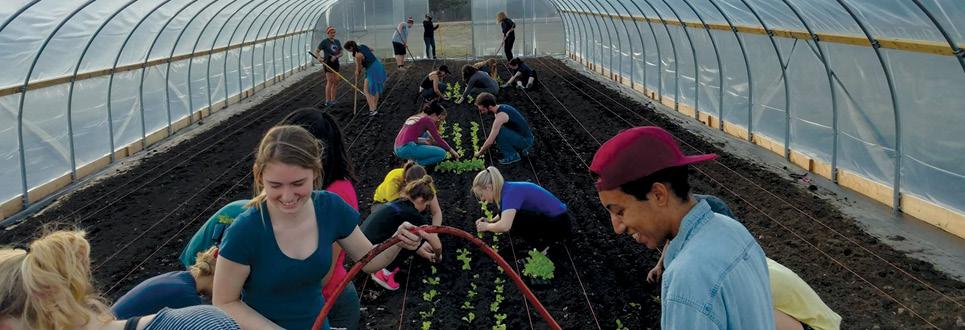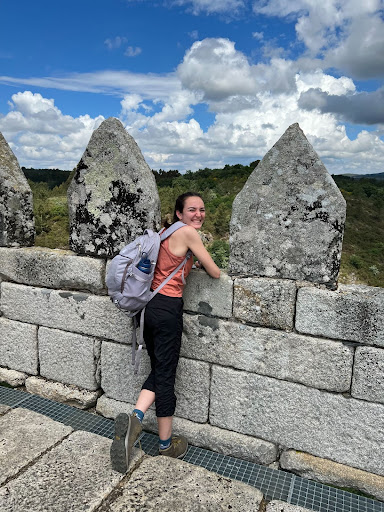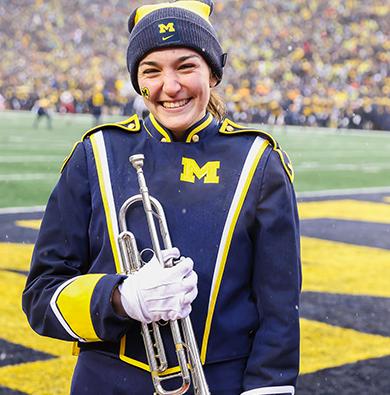Blog
Get the inside scoop about life at U-M and applying to Michigan from current student bloggers, Admissions staff, and guest faculty writers.

Get the inside scoop about life at U-M and applying to Michigan from current student bloggers, Admissions staff, and guest faculty writers.

How to plan, choose a program, find funding, and more.

About a week ago, I flew home after taking classes in Spain for nearly two months. I had always known that I wanted to study abroad in college, and this year that dream finally came true: I was selected to participate in a six-week program studying advanced Spanish language in Santiago de Compostela, Spain.
Simply put, my time in Spain was incredible. I made lasting and meaningful friendships with locals and other University of Michigan students. I had the opportunity to live with a host family and practice my language skills in all sorts of new contexts, from cooking a meal with my host sister to navigating customer service in Spanish. Not only did my fluency improve drastically, but I also learned a lot about myself and this world in the process. I could not recommend the experience more.

While I still haven’t figured out how to beat jet lag (let me know if you have suggestions), I have gathered some insight from my program to share with other students. If you’re interested in making your Michigan education global, here is my top advice to make the most of your study abroad experience:
Planning ahead is key to maximizing your study abroad experience. The best place to start is U-M’s Center for Global and Intercultural Studies (CGIS). This is our study abroad office on campus, and its website tells you exactly what you need to know about choosing your program and the application process.
The journey starts by attending a First Step session through CGIS. This is a quick meeting hosted regularly throughout the summer and academic year where advisors talk you through the basics of Michigan’s study abroad programs and application process. After your First Step session, you can meet with CGIS advisors and start your application.
It’s important to do your research ahead of time because applications are typically due months before the program start date. The next deadline is coming up on Sept. 15 for winter semester study abroad programs. Planning ahead also gives you time to meet with your CGIS and academic advisors to talk through how the credits you earn abroad will fit into your degree plan. Knowing this ahead of time is really helpful for peace of mind and long-term course planning. Also note that some study abroad courses have to be preapproved to count for certain requirements. Make sure to start the process early!
A lot of students worry that they will miss out on studying abroad because they have other commitments during the academic year that keep them in Ann Arbor. Trust me, I get it. I play trumpet in both the Michigan Marching Band and Michigan Hockey Band, and it wasn’t worth it to me to miss a whole performance season just to study abroad. Luckily, CGIS offers programs throughout the calendar year to fit any student’s schedule. You can search for study abroad opportunities by duration, anywhere from a few weeks in the summer to an entire academic year. Don’t let your schedule discourage you from studying abroad!
I also want to mention that you don’t have to be a language student to take advantage of these opportunities. As a Spanish minor, my time in Spain was invaluable for my fluency. My sister completed her language requirement through a CGIS program in Aix-en-Provence, France at the same time as me and similarly couldn’t believe how much her French improved. There’s no doubt: If you’re learning a second language, taking those courses abroad is an amazing way to do it.
At the same time, you absolutely do NOT need to be learning a language to study abroad. Students can take anything from economics to computer science courses during their time at a partner university. Some programs even allow you to complete an internship along with your coursework, which is a great way to further customize the experience to your interests. My best advice is to search CGIS programs by major and to talk with your advisor about how you can fit studying abroad into your unique degree plan.
Studying abroad can be expensive, but luckily the University of Michigan has many funding opportunities available so that these experiences are accessible to students across campus. If you’re in the College of Literature, Science, and the Arts (LSA), you can find funding opportunities on their study abroad scholarship webpage. If you’re in a different college within the university, I recommend looking into opportunities through your scholarship departments. Some majors have funding as well. For example, the Romance Languages and Literatures (RLL) department offers a variety of scholarships for students to study abroad. Finally, the Office of Financial Aid is a great place to have your questions answered and to find more information about paying for your study abroad experiences.
Finally, my best advice is to try new things once you arrive abroad. You’re not studying at a completely new university in a completely new environment to do the same things you would do in Ann Arbor. Try new foods. Talk to new people. Go on that adventure.
My favorite memory from my time in Spain was at the beginning of my second week. I was a total theatre kid in high school, and I decided to go see a show that was being put on in the city where I was studying. No one wanted to go with me, and I was still nervous about a lot of things at this point (language barriers, making new friends, etc.). Regardless, I decided to go anyway. I figured out how to order take out and purchase a student ticket, all in Spanish of course. The play was incredible, and I even chatted with the people I sat next to in the theater. Did I understand every word of the show? Absolutely not. But it was such an incredible opportunity to go out of my comfort zone and have a great evening while proving to myself that I am capable of more than I previously believed.
Choosing to study abroad was one of the best decisions that I have made as a student at the University of Michigan. I was able to participate in an incredible program that worked for my schedule and academic goals. If you’re even considering studying abroad in college, do it. It will be a once-in-a-lifetime experience that will stick with you for long after you recover from the jet lag.

Alexis Howard is a senior from Pinckney, Michigan studying public policy through the Gerald R. Ford School of Public Policy with a minor in Spanish through the College of Literature, Science, and the Arts. Alexis works as a tour guide on campus and loves meeting prospective students. Outside of class, she plays trumpet and is a rank leader in the Michigan Marching Band. In her free time, she enjoys trying new vegetarian recipes and admiring the squirrels on campus.